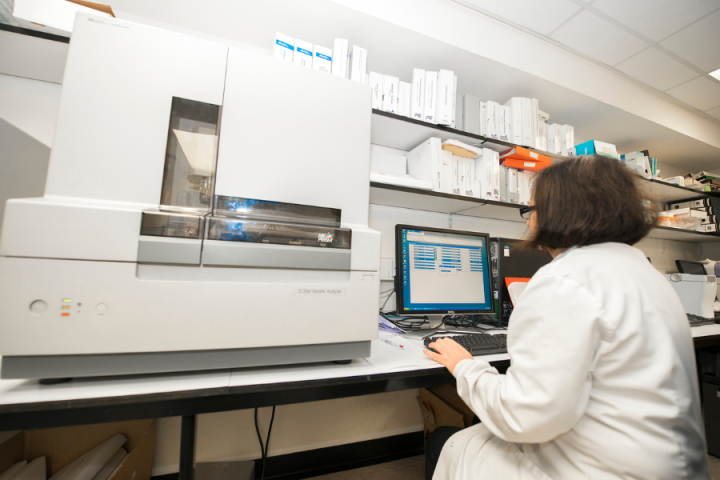Research reveals Orkney link to BRCA1 gene
One in 100 people who have grandparents from Orkney have a gene variant that causes a higher risk of developing breast and ovarian cancer, study shows: March 2023

Published in the European Journal of Human Genetics, leading geneticists from the MRC Human Genetics Unit, Usher Institute and the University of Aberdeen have linked a variant in the gene BRCA1 to a historic origin in Westray, Orkney.
Currently in Scotland, a test is available to those who know of a direct family connection to the gene or have a history of ovarian or breast cancer in their family.
Now planning is underway for a small pilot trial organised by NHS Grampian and funded by local cancer charity Friends of ANCHOR, that will offer testing for the gene variant to anyone living in Westray with a Westray-born grandparent, regardless of a family history.
If the pilot is successful, the long-term aim is to offer the test to everyone in Scotland with a Westray-born grandparent who wants it.
Most breast and ovarian cancers happen due to chance damage to genes. However, some cases are caused in part by inherited alterations which increase the chances that women will get one or both of these conditions. One of the most common of these predisposing genes is BRCA1.
Around one in 1,000 women across the UK have a BRCA1 variant giving them a high lifetime chance of developing breast cancer and ovarian cancer.
Over many years, the North of Scotland NHS genetics clinic team found the same specific single variant in the BRCA1 gene repeatedly in women from Orkney with breast and/or ovarian cancer. The genetics team used clinical genealogy to show that the patients with the variant linked into one large family with an origin in the Orkney outer isle of Westray.
University of Edinburgh scientists, funded by the Medical Research Council, examined genetic data from more than 2000 volunteers with Orkney grandparents in the Orkney Complex Disease Study (ORCADES). The study is part of Viking Genes (www.ed.ac.uk/viking), a project which aims to discover the genes and variants that influence the risk of disease.
They found the BRCA1 variant in 1% of men and women with Orkney grandparents. Many of the ORCADES participants with the variant are not closely related to branches of the family identified in the clinic, but all share historic Westray ancestors.
Professor Zosia Miedzybrodzka, Professor of Medical Genetics at the University of Aberdeen, is Director of the NHS North of Scotland Genetic Service based within NHS Grampian in Aberdeen and has run the Orkney genetic clinic for over 20 years.
She said: “Developing cancer is not solely down to carrying the BRCA1 variant alone. There are many complex factors, and some people with gene alterations will not get cancer. However, we know that testing and the right follow-up can save lives.
“Many people who have the gene alteration are unaware of it. As it is hereditary, the gene variant can affect multiple members of families. Risk-reducing surgery, breast screening with MRI and lifestyle advice can all improve health for women with the gene. Men do not need to take any particular action for themselves, but they can pass the gene onto female descendants.”
The fact that one in a hundred Orcadian women carry a high-risk variant for breast and ovarian cancer highlights the value of population studies such as Viking Genes, without which we would not know this. It is imperative that Scottish island populations are represented in research, to allow equitable delivery of genomic medicine across the country.
Orcadian Karen Scott was tested for this BRCA1 gene variant following her own cancer diagnosis in 2018. She also works for charity Clan Cancer Support in Kirkwall which provides emotional and practical support to people affected by a cancer diagnosis.
She said: “This important medical finding reflects Orkney’s unique heritage. Having personally taken part in this test, I understand the significance of this research for my family and the Orkney community. We must act on this new knowledge to improve our children’s future.”
Professor Henry Watson, from the pilot’s funding body Friends of ANCHOR said:
“It is clear there is a strong case for offering this targeted testing. The Friends of ANCHOR committee promptly approved the application for funding so that this programme can be rolled out to the Westray population as soon as possible.”
Professors Miedzybrodzka and Wilson will outline their findings at a special meeting for local residents on Westray on Thursday 16 March.
This paper describes a team effort involving people with a wide range of skills including statistical genetics, data management, lab analysis, genealogy and clinical expertise. The results of our study are of immediate value to the participants who volunteered, unlike much of human genetics research which only has impact many years in the future. It is very satisfying to be able to give something back to individuals and the community.
Links
- Clinical case study meets population cohort: identification of a BRCA1 pathogenic founder variant in Orcadians, published in the European Journal of Human Genetics
- Viking Genes website
- Jim Wilson Research Group (Affiliate) webpage
- Public-facing FAQs and explainer video outlining the findings are available on the NHS Grampian website

